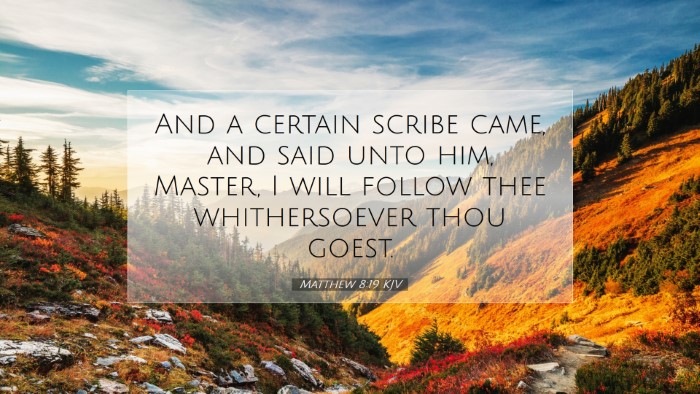Commentary on Matthew 8:19
Bible Verse: "And a scribe came and said to Him, 'Teacher, I will follow You wherever You go.'" - Matthew 8:19
Introduction
This passage highlights the encounter between Jesus and a scribe who expresses a desire to follow Him. The implications of discipleship, the cost associated with it, and the nature of true commitment to the teachings of Christ are critical themes that emerge from this interaction. Insights from esteemed public domain commentaries will deepen our understanding of the text in context.
The Scribe's Expression of Intent
Matthew Henry points out the motivation behind the scribe’s eagerness to follow Jesus. Unlike many who followed the Lord for miracles and personal gain, this scribe acknowledges Jesus as "Teacher," demonstrating respect for His authority and a recognition of His wisdom. However, Henry cautions that mere human enthusiasm may not equate to true discipleship.
Albert Barnes elaborates on the role of the scribe within the Jewish religious system. The scribe was well-versed in the Law and sought to align himself with the authority of Jesus. Barnes infers that this invites a critical examination of whether knowledge alone qualifies for discipleship, urging a reflection on the inner motives behind such declarations.
Adam Clarke adds to this discussion by emphasizing the distinction between following Jesus as a teacher and following Him as a disciple. Clarke interprets the scribe's statement as one that could easily be made out of admiration without the necessary commitment to the transformative lifestyle required of a true follower of Christ.
The Nature of Discipleship
The call to follow Jesus is profound and layered. Each commentator presents a unique perspective on what it means to follow Christ wholeheartedly.
- Matthew Henry notes that following Jesus implies a readiness to leave behind worldly comforts and relationships, suggesting that true discipleship requires sacrifice.
- Albert Barnes underscores that to follow Jesus "wherever He goes" implies a freedom from earthly ties, as the path of a disciple is often fraught with trials and tribulations.
- Adam Clarke touches on the expectation placed on those called to follow Jesus, stressing that true followers must be prepared for discomfort and challenges, in contrast to the scribe's seemingly casual assurance.
The Cost of Following Jesus
This verse invites contemplation on the cost of discipleship. Each commentator emphasizes that following Jesus is not an endeavor to be taken lightly.
- Matthew Henry states that the discipleship of Christ might involve forsaking all personal comforts. He references the example of Jesus who, though the Son of Man, had no place to lay His head, thus illustrating the necessity of prioritizing spiritual over material possessions.
- Albert Barnes aligns with this interpretation, suggesting that Jesus’ response (which occurs later in the passage) indicates that following Him means being prepared for a life of unpredictability and potential suffering.
- Adam Clarke further articulates this idea by discussing the early Christians who faced persecution, highlighting that the invitation to discipleship comes with heavy responsibilities and often societal rejection.
Application for the Modern Believer
The exploration of Matthew 8:19 provides valuable lessons for today’s believers. It challenges individuals to consider their motivations for following Christ.
- Self-Reflection: As Barnes indicates, believers should evaluate whether their faith is based on intellectual agreement or genuine desire to commit.
- Commitment: Henry emphasizes the need for readiness to face challenges and sacrifices, urging modern disciples to define their priorities in light of their faith.
- Community Aspect: Clarke points to the necessity of fellowship among believers who are called to embark on this journey together, reinforcing the importance of support in the face of trials.
Conclusion
Matthew 8:19 serves as a sobering reminder of the radical nature of Jesus’ call to discipleship. The insights gathered from various respected commentaries encourage pastors, students, theologians, and scholars to engage deeply with the text, recognizing that genuine discipleship entails far more than simple outward expression; it demands life-changing commitment and the acceptance of the cost that accompanies following Christ. As we reflect on our own discipleship journeys, may we embrace the challenge to follow Jesus wholeheartedly, regardless of the sacrifices required.


